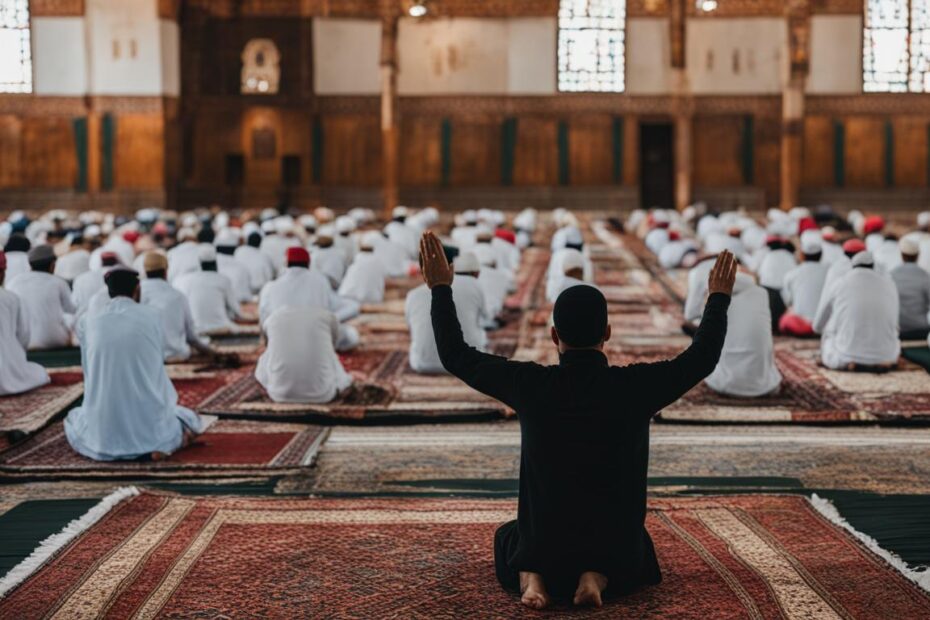The Zuhr prayer is one of the five obligatory prayers in Islam. It is performed at the noon hour and holds great significance for Muslims. In this comprehensive guide, we will take you through the step-by-step process of how to pray Zuhr, ensuring you have the essential knowledge to enhance your spiritual journey.
Key Takeaways:
- Prayer plays a fundamental role in Islam and is one of the pillars of the religion.
- Zuhr prayer consists of specific steps that must be followed, including wudu (ritual purification) and reciting the necessary verses.
- Performing Zuhr prayer on time is highly recommended and brings numerous benefits.
- Cleanliness and purity are essential in Salah, ensuring one’s body, clothing, and prayer area are free from impurities.
- The intention (niyyah) in Salah serves as a reminder of why we are performing the prayer and helps in maintaining sincerity and focus.
The Importance of Prayer
Salah, or prayer, is one of the fundamental pillars of Islam. It was made obligatory by Allah and is the last thing to be taken away from the religion. The importance of prayer is such that it is the first action a believer will be questioned about on the Day of Judgment. It is our key to success in both this world and the hereafter.
Prayer serves as a means of communication between the human and the Creator. Through prayer, we express our gratitude, seek forgiveness, and ask for guidance. It is a time when we humble ourselves before Allah, acknowledging our dependence on Him and recognizing His power and mercy. Prayer not only strengthens our connection with Allah, but also helps us find inner peace, strengthen our faith, and purify our hearts.
Additionally, prayer offers numerous spiritual, psychological, and physical benefits. It provides a sense of discipline and routine in our lives, grounding us in our faith and reminding us of our purpose. Prayer serves as a source of comfort and solace during times of distress and hardship. It allows us to seek solace in Allah’s presence, knowing that He is listening to our prayers and will answer them in the best way possible. Moreover, prayer has been found to have positive effects on mental well-being, reducing stress and anxiety and promoting mental clarity and focus.

The Significance of Salah
“And establish prayer and give zakah and bow with those who bow [in worship and obedience].” – Quran (2:43)
The importance of prayer is emphasized throughout the Quran and the teachings of the Prophet Muhammad (peace be upon him). It is regarded as a form of worship that brings immense spiritual rewards and blessings. By fulfilling this obligatory act, Muslims demonstrate their submission and devotion to Allah, seeking His pleasure and guidance in every aspect of life.
Prayer is not just a mechanical ritual, but an opportunity to connect with Allah on a deeply personal level. It is a time when we can seek His forgiveness, ask for His guidance, and offer our gratitude for His countless blessings. Through prayer, we are reminded of our purpose and our responsibility to fulfill our duties towards Allah and our fellow human beings.
In conclusion, prayer holds great significance in the life of a Muslim. It is through prayer that we establish a direct connection with our Creator, seeking His guidance, forgiveness, and blessings. Prayer serves as a source of strength, solace, and discipline, shaping our character and enhancing our spiritual journey. By recognizing the importance of prayer and striving to fulfill this duty with sincerity and devotion, we can reap the countless benefits it offers and draw closer to Allah.
The Definition of Salah (Prayer)
The Arabic word Salah originates from the word silah, which means connection. It is a connection between the human and their Creator, Allah. Salah is the name given to the formal prayer of Islam, one of the obligatory rites of the religion. Every obedient adult Muslim is required to perform Salah five times a day. It is a sacred act of worship that holds deep spiritual significance for Muslims.
Salah serves as a means of communication and reverence between the worshipper and Allah. It is a time of reflection, gratitude, and seeking closeness to the Creator. Through Salah, Muslims offer their devotion, seek forgiveness, and seek guidance from Allah. The act of performing Salah involves specific physical movements, recitation of Quranic verses, and supplications.
The Meaning of Prayer in Islam
In Islamic teachings, prayer is not merely a ritualistic activity, but a profound spiritual engagement. It symbolizes submission, humility, and surrender to the will of Allah. Prayer enables Muslims to establish a direct connection with Allah, seek His mercy, and attain spiritual purification.
Islamic prayer encompasses both the physical and spiritual aspects of worship. While the physical movements of Salah demonstrate obedience and discipline, the spiritual engagement involves concentration, mindfulness, and sincerity of intention. It is a holistic practice that aims to align the heart, mind, and body towards the worship of Allah.
Islamic Prayer Definition
Islamic prayer, or Salah, is a comprehensive act of worship prescribed by Allah for Muslims. It is a way to express devotion, seek guidance, and seek forgiveness. Salah is performed at specific times throughout the day, and each prayer consists of a prescribed number of units (Rak’ahs).
The obedience and commitment to performing Salah reflect a deep sense of faith and a desire to maintain a strong spiritual connection with Allah. Through Salah, Muslims strive to achieve tranquility, righteousness, and the blessings of Allah in this life and the hereafter.
The Steps of Zuhr Prayer
The Zuhr prayer is a sacred act of worship in Islam, and it consists of specific steps that must be followed. These steps ensure that the prayer is performed correctly and in accordance with the teachings of the Prophet Muhammad (PBUH). Understanding the procedure of the Zuhr Salah is crucial for every Muslim seeking to deepen their connection with Allah. Let us explore the method of performing Zuhr prayer step by step:
Purification and Intention
Before beginning the Zuhr prayer, it is essential to perform wudu (ritual purification). Wudu involves washing specific parts of the body, such as the hands, mouth, face, and feet. It is a symbolic act of cleansing oneself physically and spiritually before standing in prayer. Once the wudu is complete, make the intention in your heart to perform the Zuhr prayer with sincerity and devotion.
Standing and Recitation
Stand facing the qibla (the direction of the Kaaba in Makkah) and raise your hands to your ears, saying the opening takbeer (saying Allahu Akbar – Allah is the Greatest). Begin the recitation of Surah al-Fatiha, the first chapter of the Quran, followed by another surah or a few verses from the Quran. The recitation should be done with humility and concentration, seeking to understand and reflect upon its meaning.
Bowing, Prostrating, and Sitting
After completing the recitation, bow down into the ruku position, placing your hands on your knees and saying “Subhanallah” (Glory be to Allah) at least three times. Rise from the bowing position, stand upright, and then prostrate on the ground, placing your forehead, nose, hands, and knees on the floor. In this position, say “Subhanallah” at least three times. After prostration, sit down and recite the final tashahud, a supplication seeking blessings and peace upon the Prophet Muhammad (PBUH). Finally, turn your head to the right and say “Assalamu alaikum wa rahmatullah” (Peace be upon you, and the mercy of Allah), and then turn your head to the left and repeat the greeting.
By following these steps, you can perform the Zuhr prayer with mindfulness and reverence. It is important to note that the steps may vary slightly depending on the school of thought or the region. It is recommended to seek guidance from a knowledgeable teacher or refer to reliable Islamic resources for more detailed instructions.
| Step | Description |
|---|---|
| 1 | Perform wudu (ritual purification) |
| 2 | Make the intention to perform Zuhr prayer |
| 3 | Stand facing the qibla |
| 4 | Recite the opening takbeer and Surah al-Fatiha |
| 5 | Recite an additional surah or verses from the Quran |
| 6 | Bow down into the ruku position |
| 7 | Prostrate on the ground |
| 8 | Sit for the final tashahud |
| 9 | Turn the head to the right and left to greet |
Zuhr Prayer Timings: When to Perform Zuhr Prayer
Knowing the proper timing for performing the Zuhr prayer is essential for every Muslim. The Zuhr prayer is to be performed at noon, after the sun has passed its zenith. It should be done before the start of the Asr prayer. However, it’s important to note that the exact timing may vary depending on the geographical location.
To ensure accuracy and precision, it is recommended to refer to reliable Islamic prayer timetables or mobile apps for the most accurate Zuhr prayer times. By doing so, you can align your worship with the specific time frame designated for the performance of the Zuhr prayer.
Praying the Zuhr prayer at the designated time holds great significance. It allows you to fulfill your religious duty in a timely manner and establish a strong connection with Allah. By adhering to the prescribed timing of Zuhr prayer, you can enhance your spiritual journey and reap the numerous rewards associated with punctuality in prayer.
| City | Zuhr Prayer Time |
|---|---|
| New York | 12:30 PM |
| London | 1:00 PM |
| Dubai | 3:00 PM |
| Kuala Lumpur | 5:00 PM |
| Sydney | 7:00 PM |
Table: Approximate Zuhr Prayer Times in Different Cities
The Number of Rak’ahs in Zuhr Prayer
The Zuhr prayer consists of 4 Rak’ahs (units) of prayer. Each Rak’ah involves specific movements and recitations. To perform the Zuhr Salah, the worshipper starts by making the intention, followed by performing wudu (ritual purification). Then, they stand facing the qibla (direction of Makkah) and recite the opening takbeer. After that, they recite Surah al-Fatiha and an additional surah or verses of the Quran. Next, the worshipper performs ruku (bowing) and then stands upright again. Following that, they prostrate and finally sit for the final tashahud (supplication). These steps are repeated to complete the remaining 2 Rak’ahs, making a total of 4 Rak’ahs in the Zuhr prayer.
It is important to note that each Rak’ah has its specific recitations and movements, and they should be performed in the correct sequence and with focus and reverence. The recitation of the Quran and the supplications during the prayer are opportunities to engage with the words of Allah and seek His guidance and blessings.
By understanding and following the prescribed number of Rak’ahs in the Zuhr prayer, Muslims can ensure that their prayer is valid and in accordance with the teachings of Islam. It is a means of seeking closeness to Allah and experiencing the spiritual benefits that come with sincere worship.
Table: Steps of the Zuhr Prayer
| Rak’ah | Steps |
|---|---|
| 1 | Make the intention, perform wudu, stand facing the qibla, recite the opening takbeer, recite Surah al-Fatiha and an additional surah or verses of the Quran, perform ruku, stand upright again, prostrate, sit for the final tashahud |
| 2 | Repeat the same steps as mentioned in Rak’ah 1 |
| 3 | Repeat the same steps as mentioned in Rak’ah 1 |
| 4 | Repeat the same steps as mentioned in Rak’ah 1 |

Tips for Praying Zuhr on Time
Praying Zuhr on time is of utmost importance for every Muslim. It is a way of demonstrating our commitment and devotion to Allah. Praying on time holds numerous benefits and rewards that can enhance our spiritual journey and strengthen our connection with the Creator.
Firstly, praying Zuhr on time helps us to develop discipline and consistency in our worship. By prioritizing our prayers and performing them at the designated times, we demonstrate our obedience to Allah’s commandments. This act of devotion can bring a sense of peace and tranquility to our daily lives and helps us maintain focus amidst the challenges we may face.
Moreover, praying on time allows us to seek the blessings and rewards associated with performing our prayers promptly. The Prophet Muhammad (PBUH) emphasized the importance of praying on time and encouraged his followers to be diligent in their practice. By adhering to this advice, we not only fulfill our religious duties but also receive the additional rewards promised by Allah for offering our prayers at their appointed times.
“The best of deeds is to perform the prayer in its right time, and to adore Allah, the Most High, as much as you can.” – Prophet Muhammad (PBUH)
Additionally, praying Zuhr on time helps to protect us from falling into sinful actions. When we delay our prayers without valid reasons, we risk getting caught up in worldly distractions or engaging in activities that are not pleasing to Allah. By prioritizing our prayers and performing them on time, we create a barrier against temptation and strengthen our spiritual resilience.
In conclusion, praying Zuhr on time is not only a religious obligation but also a means of attaining numerous benefits and rewards. By observing punctuality in our prayers, we develop discipline, seek Allah’s blessings, and safeguard ourselves from sin. Let us strive to make praying on time a regular practice, prioritizing our relationship with Allah and nurturing our spiritual growth.
| Benefits of Praying on Time |
|---|
| 1. Develops discipline and consistency in worship |
| 2. Brings peace and tranquility to daily life |
| 3. Earns additional rewards and blessings |
| 4. Protects from falling into sinful actions |
The Concept of Purity in Salah
The concept of purity, or tahaarah, holds great importance in Salah, the formal prayer of Islam. It is essential to observe cleanliness and purification before engaging in prayer, as it helps to purify one’s intention and create a state of physical and spiritual readiness. By performing wudu (ritual purification) and ensuring that the body, clothing, and prayer area are free from impurities, believers can establish a pure connection with Allah. This emphasis on purity serves as a reminder of the sanctity of prayer and the need to approach it with utmost reverence.
Keeping oneself clean is not only a physical act but also a reflection of one’s internal state. The Prophet Muhammad (PBUH) placed significant emphasis on cleanliness and stated, “Cleanliness is half of faith.” By maintaining cleanliness in prayer, individuals cultivate a sense of discipline and respect for the act of worship. It also symbolizes the purification of one’s heart and mind, enabling a deeper connection with Allah during Salah.
“Allah does not look at your appearances or your possessions; but He looks at your hearts and your deeds.” – Prophet Muhammad (PBUH)
The Importance of Cleanliness in Prayer
Cleanliness in prayer is not limited to physical hygiene but also includes maintaining a clean intention and focusing solely on the worship of Allah. By ensuring purity, believers can engage in Salah with a clear and devoted mindset. This focus on cleanliness extends beyond the individual to the prayer area as well. Muslims are encouraged to choose a clean and pure space for prayer and to remove any impurities that may be present.
Moreover, the importance of purity in Salah stems from the belief that prayer is a direct communication with Allah. It is a spiritual journey that requires sincerity and devotion. By observing cleanliness, believers demonstrate their respect and dedication to Allah, creating an environment conducive to spiritual connection and growth. The purity of the body, clothing, and surroundings serves as a reminder of the sacredness of Salah and the need to approach it with reverence and humility.
| Benefits of Purity in Salah | Importance of Cleanliness |
|---|---|
| 1. Facilitates a state of physical and spiritual readiness | 1. Reflects the sanctity of prayer and the reverence for worship |
| 2. Enhances focus and concentration during Salah | 2. Reinforces the discipline and respect for the act of worship |
| 3. Symbolizes the purification of the heart and mind | 3. Cultivates a deeper connection with Allah |
| 4. Reminds believers of the sacredness of Salah | 4. Creates an environment conducive to spiritual growth |
By understanding the concept of purity in Salah and embracing its significance, believers can elevate their worship and strengthen their connection with Allah. Cleanliness in prayer not only enhances the individual’s experience but also contributes to the collective spiritual atmosphere within the Muslim community. It serves as a reminder of the importance of sincerity, humility, and devotion in the act of worship, ultimately leading to a deeper understanding and fulfillment of Salah.

The Role of Intentions in Salah
When it comes to performing Salah, the role of intentions cannot be understated. Intentions, or niyyah, are the driving force behind our prayers, setting the tone for our worship and determining its sincerity. In Islam, intentions hold great significance, as they reflect our internal dedication and purpose in seeking the pleasure of Allah.
By setting clear intentions before every prayer, we remind ourselves of the purpose behind our acts of worship. The intention to perform Salah purely for the sake of Allah helps us maintain focus and sincerity throughout the prayer. It aligns our hearts and minds, ensuring that our worship is not driven by worldly desires or seeking recognition from others.
Additionally, intentions in Salah serve as a reminder of the blessings and rewards that await us. When we understand the importance of Salah and its impact on our spiritual growth, we approach each prayer with a sense of anticipation and gratitude. Our intentions become a means of seeking closeness to Allah and striving for excellence in our worship.
“Verily, actions are judged by intentions, and every person shall be rewarded according to their intentions.” – Prophet Muhammad (PBUH)
Importance of Intentions in Salah
The importance of intentions in Salah extends beyond the act of prayer itself. It shapes our mindset and attitude towards worship, enhancing our spiritual connection with Allah. Here are some key reasons why intentions matter:
- 1. Sincerity: Intentions purify our worship, ensuring that we seek Allah’s pleasure alone and not the approval of others.
- 2. Focus: Clear intentions help us concentrate on the present moment, directing our thoughts towards Allah and avoiding distractions.
- 3. Consistency: Setting intentions reaffirms our commitment to establishing a regular prayer practice, fostering a sense of discipline and devotion.
- 4. Accountability: By consciously stating our intentions, we hold ourselves accountable for the quality and sincerity of our Salah.
In conclusion, intentions play a fundamental role in Salah, guiding our mindset and enhancing the spiritual experience of our prayers. By setting sincere intentions, we align our hearts with the purpose of worship and open ourselves to the abundant blessings and rewards that Allah has promised.
Table: Comparing the Benefits of Intention in Salah
| Benefits | Importance of Intentions in Salah | Impact on Worship |
|---|---|---|
| Sincerity | ✓ | Ensures worship is solely for Allah. |
| Focus | ✓ | Helps maintain concentration and avoid distractions. |
| Consistency | ✓ | Reaffirms commitment to establishing a regular prayer practice. |
| Accountability | ✓ | Holds oneself accountable for the quality and sincerity of Salah. |
Additional Points to Consider in Salah
When performing Salah, there are certain additional points and etiquettes that should be kept in mind to enhance the quality of worship. These points help in maintaining focus, sincerity, and humility during prayer. Here are some important considerations:
1. Facing the Qibla:
It is crucial to face the Qibla, the direction of the Kaaba in Makkah, during Salah. This signifies unity and uniformity among Muslims in their worship, regardless of their geographic location. Align yourself with the Qibla before starting the prayer.
2. Reciting Necessary Supplications and Verses:
In addition to the recitation of Surah al-Fatiha and an additional surah or verses, there are other supplications and Quranic verses that can be recited in different positions of Salah. These include seeking refuge from Satan, praising Allah, and seeking forgiveness. Familiarize yourself with these supplications and incorporate them into your prayer.
3. Maintaining Concentration and Focus:
During Salah, it is essential to maintain concentration and focus on the words and actions of the prayer. Avoid distractions and try to clear your mind from worldly thoughts. Remember that Salah is a direct connection with Allah, so strive to establish a deep spiritual connection during this time.
4. Observing Proper Positioning and Movements:
Follow the proper positioning and movements of Salah. Ensure that you perform the bowing (ruku), prostration (sujood), and standing upright with correct posture. Maintain balance and avoid rushing through the movements. It is important to perform each action with tranquility and reverence.
By keeping these additional points and etiquettes in mind, you can enhance the quality of your Salah and experience a deeper connection with Allah. Strive to make your prayer a time of spiritual reflection and devotion.
| Additional Points | Etiquettes of Prayer | Common Mistakes |
|---|---|---|
| Facing the Qibla | Observing proper positioning and movements | Distractions during Salah |
| Reciting necessary supplications and verses | Maintaining concentration and focus | Rushing through the prayer |
Benefits and Rewards of Praying Zuhr Prayer
Praying the Zuhr prayer holds immense rewards and benefits that enrich the spiritual journey of a Muslim. This midday prayer, performed after the sun has passed its zenith, serves as a means of seeking forgiveness from Allah and purifying the soul. By the consistent practice of the Zuhr prayer, a believer strengthens their connection with the Creator and nurtures their faith.
“Verily, the prayer is a coolness to my eyes.” – Prophet Muhammad (PBUH)
One of the virtues of the Zuhr prayer is that it provides protection from the Hell-fire. It is believed that those who perform the Zuhr prayer regularly will be saved from the torment of the Hell-fire on the Day of Judgment. Additionally, the Zuhr prayer brings blessings and barakah into one’s life, both in this world and the hereafter. It helps maintain a sense of discipline and mindfulness, leading to a more balanced and purposeful life.
Praying the Zuhr prayer also allows individuals to cultivate a sense of gratitude and humility. It serves as a reminder of our dependence on Allah and encourages us to be grateful for His blessings. By dedicating a portion of our day to prayer, we acknowledge the importance of our spiritual well-being and prioritize our relationship with Allah.
The Rewards of Performing Zuhr Salah
The rewards of performing the Zuhr Salah extend beyond the individual. It is believed that the blessings and supplications made during this prayer can benefit the entire Ummah (Muslim community). By aligning our hearts and minds in prayer, we contribute to a collective consciousness of unity and harmony among Muslims worldwide.
As with all acts of worship in Islam, sincerity is key. By performing the Zuhr prayer with a genuine intention and complete devotion, believers can maximize the rewards and benefits associated with this significant prayer. It is a means of seeking closeness to Allah and finding solace in His presence.
| Benefits of Praying Zuhr | Rewards of Performing Zuhr Salah | Virtues of Zuhr Prayer |
|---|---|---|
| Protection from Hell-fire | Blessings and barakah in life | Gratitude and humility |
| Spiritual purification | Benefit to the entire Ummah | Sincerity and devotion |
| Strengthened connection with Allah |
Conclusion
In conclusion, this comprehensive guide has provided essential knowledge on how to pray Zuhr, one of the five obligatory prayers in Islam. By following the step-by-step process, understanding the significance of prayer, and adhering to the proper timings and etiquettes, Muslims can enhance their spiritual journey and strengthen their connection with Allah.
The Zuhr prayer holds immense rewards and benefits, including seeking forgiveness, purifying the soul, and ensuring success in both this world and the hereafter. By performing the Zuhr prayer on time and with sincerity, one can strive to attain these blessings and deepen their relationship with the Creator.
We hope this article has served as a valuable resource in mastering the art of Zuhr prayer. Remember to refer to reliable Islamic prayer timetables or mobile apps for accurate timing information, and always approach prayer with humility, focus, and sincere intentions. May your journey of prayer be filled with blessings and spiritual growth.
FAQ
What is the Zuhr prayer?
The Zuhr prayer is one of the five obligatory prayers in Islam, to be performed at the noon hour.
How many Rak’ahs are there in the Zuhr prayer?
The Zuhr prayer consists of 4 Rak’ahs (units) of prayer.
When should the Zuhr prayer be performed?
The Zuhr prayer should be performed at noon, after the sun has passed its zenith and before the start of the Asr prayer.
How do I perform the Zuhr prayer?
The steps of the Zuhr prayer include making the intention, performing wudu (ritual purification), facing the qibla (direction of Makkah), reciting specific verses from the Quran, bowing, prostrating, and sitting for the final supplication.
How can I ensure I pray Zuhr on time?
It is recommended to pray Zuhr as soon as it is time and to refer to reliable Islamic prayer timetables or mobile apps for accurate Zuhr prayer times.
What is the importance of purity in Salah?
Purification, such as performing wudu and ensuring cleanliness, plays a vital role in Salah as a way to purify one’s intention and prepare for worship.
What is the role of intentions in Salah?
Intentions are crucial in Salah as they serve as a reminder of why we are performing Salah and help maintain sincerity and focus throughout the prayer.
Are there any additional points to consider in Salah?
Yes, it is important to face the qibla, recite necessary supplications, maintain concentration and proper positioning, and strive for humility and sincerity in prayer.
What are the benefits of praying the Zuhr prayer?
Praying the Zuhr prayer brings numerous benefits, such as seeking Allah’s forgiveness, purifying the soul, and strengthening the connection between the worshipper and the Creator.








